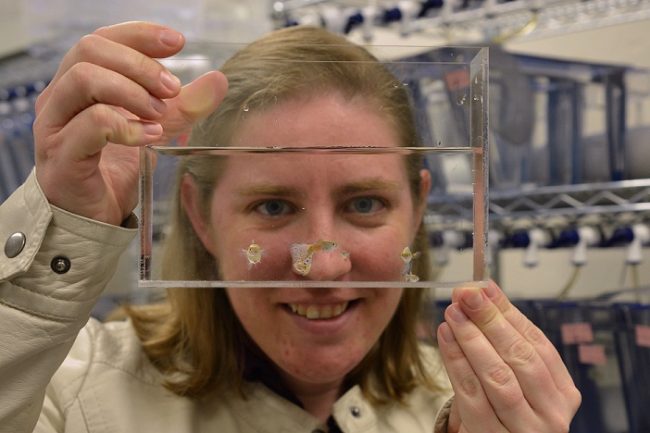Biology faculty develops accessible, hands-on experiments to teach evolution

Being an evolutionary biologist is no longer just for professionals. Georgia Southern Department of Biology Professor Emily Kane, Ph.D., has developed a simple kit that allows grade school students to become scientists in their own classrooms.
Kane’s work was prompted by surveys showing that students often have a poor understanding of evolution despite its importance to biology. She says knowledge is improved when students understand and apply the scientific method, but this can be expensive and time consuming. Kane and her colleagues have helped solve this problem by creating inexpensive, self-guided kits that are easy to use for both teachers and students.
Each kit contains a short video to introduce students to the biology of Trinidadian guppies, as well as instructional materials to guide student inquiry. Students use observations of live guppies to develop and test predictions about key aspects of evolution such as variation, inheritance, selection and change over time. This hands-on experience of applying the scientific method to study principles of evolutionary biology asks students to make scientific illustrations, observe animal behavior, analyze data, draw conclusions and write about their results in a journal.
“Allowing students to answer questions on their own using the scientific process gives them a much deeper understanding of why scientists make the conclusions that they do,” says Kane.
Although designed primarily for middle and high school students, the guppy kits are ideal for outreach to the broader public.The kits have garnered national attention, and Kane’s work is featured in the latest issue of The American Biology Teacher. On a local level, Kane and her students have tested the kits with participants at the Statesboro Mainstreet Farmer’s Market.
Kane says both adults and children responded enthusiastically to the kit’s hands-on, inquiry-based approach. The focus on live animals also facilitates interest and learning.
Kane says this sort of outreach “is important because it is a tangible way for me to give back to a community who has helped make my research possible. The feedback between students in the classroom, community members and researchers in my field are all important components to doing and teaching science.”
A significant advantage of the guppy kits is that most of the materials are available for free online or in The American Biology Teacher publication.
To learn more about the Department of Biology, visit GeorgiaSouthern.edu/biology.
Georgia Southern University, a public Carnegie Doctoral/Research institution founded in 1906, offers 142 degree programs serving more than 27,000 students through nine colleges on three campuses in Savannah, Statesboro, Hinesville and online instruction. A leader in higher education in southeast Georgia, the University provides a diverse student population with expert faculty, world-class scholarship and hands-on learning opportunities. Georgia Southern creates lifelong learners who serve as responsible scholars, leaders and stewards in their communities. Visit GeorgiaSouthern.edu.
Posted in Press Releases

